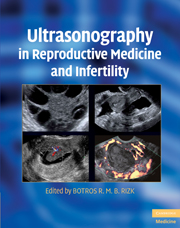Book contents
- Ultrasonography in Reproductive Medicine and Infertility
- Ultrasonography in Reproductive Medicine and Infertility
- Copyright page
- Dedication
- Contents
- Contributors
- Foreword
- Preface
- Acknowledgments
- Section 1: Imaging techniques
- Chapter 1 The future of imaging and assisted reproduction
- Chapter 2 Ultrasonography:
- Chapter 3 Hysterosalpingography
- Chapter 4 Fertiloscopy
- Chapter 5 Sonohysterography
- Chapter 6 Diagnostic hysteroscopy
- Chapter 7 Ethics of ultrasonography
- Section 2: Ultrasonography in infertility
- Section 3: Ultrasonography in assisted reproduction
- Section 4: Early pregnancy after infertility treatment
- Index
Chapter 7 - Ethics of ultrasonography
from Section 1: - Imaging techniques
Published online by Cambridge University Press: 07 September 2011
- Ultrasonography in Reproductive Medicine and Infertility
- Ultrasonography in Reproductive Medicine and Infertility
- Copyright page
- Dedication
- Contents
- Contributors
- Foreword
- Preface
- Acknowledgments
- Section 1: Imaging techniques
- Chapter 1 The future of imaging and assisted reproduction
- Chapter 2 Ultrasonography:
- Chapter 3 Hysterosalpingography
- Chapter 4 Fertiloscopy
- Chapter 5 Sonohysterography
- Chapter 6 Diagnostic hysteroscopy
- Chapter 7 Ethics of ultrasonography
- Section 2: Ultrasonography in infertility
- Section 3: Ultrasonography in assisted reproduction
- Section 4: Early pregnancy after infertility treatment
- Index
Summary
Keywords
- Type
- Chapter
- Information
- Ultrasonography in Reproductive Medicine and Infertility , pp. 64 - 66Publisher: Cambridge University PressPrint publication year: 2010



